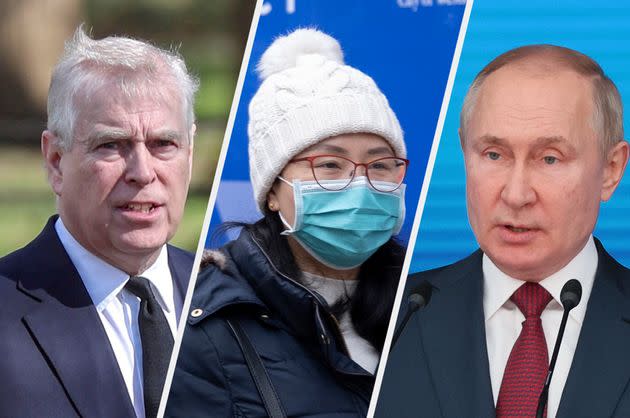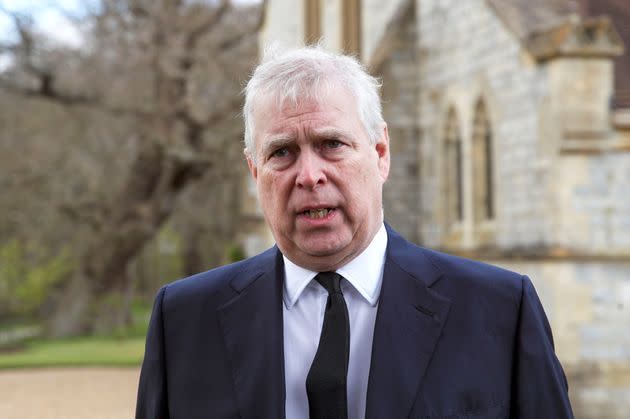5 Bits Of News You Might Have Missed This Week Because Of Partygate

While people up and down the country have been consumed by the twists and turns of the partygate saga, several significant news stories have slipped under the radar.
As arguments over Boris Johnson being “ambushed by a cake” unfolded, Covid levels are still quite high, Spotify joined in with a vaccine row, Ukraine and Russia locked horns, Prince Andrew’s civil case developed and the National Insurance hike is dividing people, once again.
Here are the important bits of news you might have missed over the last week.
1. Covid levels remain high as Plan B is dropped
Covid levels have remained steady over recent days, with numbers hovering just under 100,000 daily positive cases.
Infection levels were dropping dramatically throughout January after reaching a peak towards at the end of 2021, but numbers now appear to have plateaued.
This data is especially important at the moment as Downing Street lifted all of the Plan B restrictions in England on Thursday.
Wearing a face mask is no longer compulsory in most settings, Covid passes do not have to be used for any social venues and the working from home guidance has also been dropped.
Experts have questioned the dramatic decision to revert back to Plan A considering the NHS is still struggling and more Covid waves could be just around the corner.
However, professor Tim Spector from the Zoe Covid study said that most infections among the vaccinated people are “mild” meaning there should not be a significant strain on the NHS and fewer deaths despite the high infection rate.
Deaths appear to have peaked at around 300 a day, comparable to that seen during a difficult flu season.

2. Tensions between Ukraine and Russia rise
Russia has been piling the pressure on Ukraine by gathering around 100,000 troops by the neighbouring country’s borders.
Russia has long feared that Ukraine – which used to be part of the same country – has been drifting out of its grasp and moving towards western powers by expressing a desire to join the EU and the military alliance Nato (Northern Atlantic Treaty Organisation).
Russian president Vladimir Putin said last year that Russian and Ukrainians are “one people, a single whole”, and seems to be trying to bring Ukraine back into his country’s sphere.
While the exact timing of his aggressive military move isn’t entirely clear, some people think Putin was motivated by the West’s messy Afghanistan withdrawal – a lack of unity meaning it’s a good time for him to strike.
Others think the resignation of Germany’s chancellor Angela Merkel has left a power vacuum for Putin to strike.
Either way, the west is not backing down. The US, the UK and the EU have all expressed a desire to protect Ukraine and its independence at almost any cost.
There have been mentions of economic sanctions and sending Western troops in to support Ukraine, prompting further fears of war although Putin has denied he has any intention to go on the offensive.
Russia wants Nato to promise never to make Ukraine a member, but the alliance has refused. US president Joe Biden has warned that Russia could invade Ukraine as soon as next month.

3. Prince Andrew’s legal statement
The Queen’s second eldest son released an 11-page statement about the civil case against him this week.
Andrew is being sued by Virginia Giuffre, who has accused him of sexually assaulting her on three occasions between 2000 and 2002 when she was an underaged teenager.
She claims she was being sex trafficked by the late Jeffrey Epstein (who killed himself before his trial in 2019) and his ex-girlfriend Ghislaine Maxwell, who was recently convicted as a sex trafficker.
Andrew has vehemently denied all the allegations against him.
In his new document, he says he was not close friends with Maxwell and lacks “sufficient information to admit or deny” Giuffre’s sex-trafficking allegations about Epstein.
Andrew has denied participating in any abuse with the late billionaire, and his counsel claim he lacks the information to respond to Giuffre’s claim that Maxwell was “the highest-ranking recruiter in Epstein’s sex-trafficking enterprise”.
He calls for a trial by jury too, although it’s important to note that Giuffre had already requested this.
Her legal team have criticised Andrew’s response, and said they look forward to confronting the royal “with his denials and attempts to blame Ms Giuffre for her own abuse at the deposition and at trial”.
Giuffre is seeking an undisclosed amount of damages.
The Palace has already stripped Andrew of his military affiliations and royal patronages, pointing out that he will be defending the case as a “private citizen”.
The trial will be going ahead the year the Queen celebrates her platinum jubilee.

4. National Insurance hike
As the cost of living crisis draws ever closer, some Tory backbenchers have called for the increase in National Insurance contributions to be delayed.
No.10 confirmed this week that there were “no plans” to scrap the increase, due in April, with the cabinet “fully committed” to going ahead with the hike.
The prime minister has defended the plan by saying: “We have to fund the Covid backlog, we have to fix social care.”
The current plans mean employees, employers and the self employed will all have to pay 1.25% more in the pound for National Insurance from April 2022 for a year.
From that point onwards, extra tax will be collected through a Health and Social Care levy.
The policy has been criticised for hitting the poorest the hardest just as inflation and soaring energy costs come in, as an individual earning £20,000 a year will pay an extra £130 in tax while someone on £50,000 will pay £505 more.
5. Spotify, Neil Young, Joe Rogan and the WHO
The streaming platform became embroiled in a row between podcaster Joe Rogan and singer-songwriter Neil Young this week.
Young announced that he did not want to share a platform with Rogan, the name behind the The Joe Rogan Experience podcast, after he promoted anti-vaccine messages.
But Rogan handed Spotify the exclusive rights to his show in a $100 million (£74.5 million) deal back in 2020, which is now the most popular podcast on the platform.
In a now-deleted letter to his management and record label, Young wrote: “I am doing this because Spotify is spreading fake information about vaccines – potentially causing death to those who believe the disinformation being spread by them. Please act on this immediately today and keep me informed of the time schedule!”
He added: “They [Spotify] can have [Joe] Rogan or Young. Not both.”
In December, approximately 270 medics also signed an open letter asking Spotify to stop spreading Rogan’s claims.
The World Health Organisation (WHO) has now weighed in and sided with Young, thanking him for “standing up against misinformation and inaccuracies” around Covid vaccines, especially as we “all have a role to play to end this pandemic and infodemic”.
The social media hashtag #CancelSpotify and the phrase “I stand with Neil Young” started to circulate online as Young’s fans rallied around him.
Yet, Spotify started to remove Young’s music earlier this week, seemingly siding with Rogan.
The platform released a response on Wednesday which read: “We regret Neil’s decision to remove his music from Spotify but hope to welcome him back soon.”
It also claimed that it had removed more than 20,000 podcast episodes linked to Covid since the pandemic started, although Rogan himself says he has not been policed since signing his Spotify deal.

This article originally appeared on HuffPost UK and has been updated.
Related...
Everything You Need To Know About Ukraine And Russia In 4 Minutes
How Has Prince Andrew Just Responded To The Civil Case Against Him?
National Insurance Tax Rise 'Going Ahead' In April, Says Minister
Going Gray Waiting: People React As The Met Requests Further Delay To Partygate Report
Boris Johnson Accused Of Leading 'Zombie Government' Distracted By Partygate Row
Question Time Row Erupts Over Partygate: 'If We Can't Trust The PM, It All Falls Apart!'

 Yahoo Movies
Yahoo Movies 






